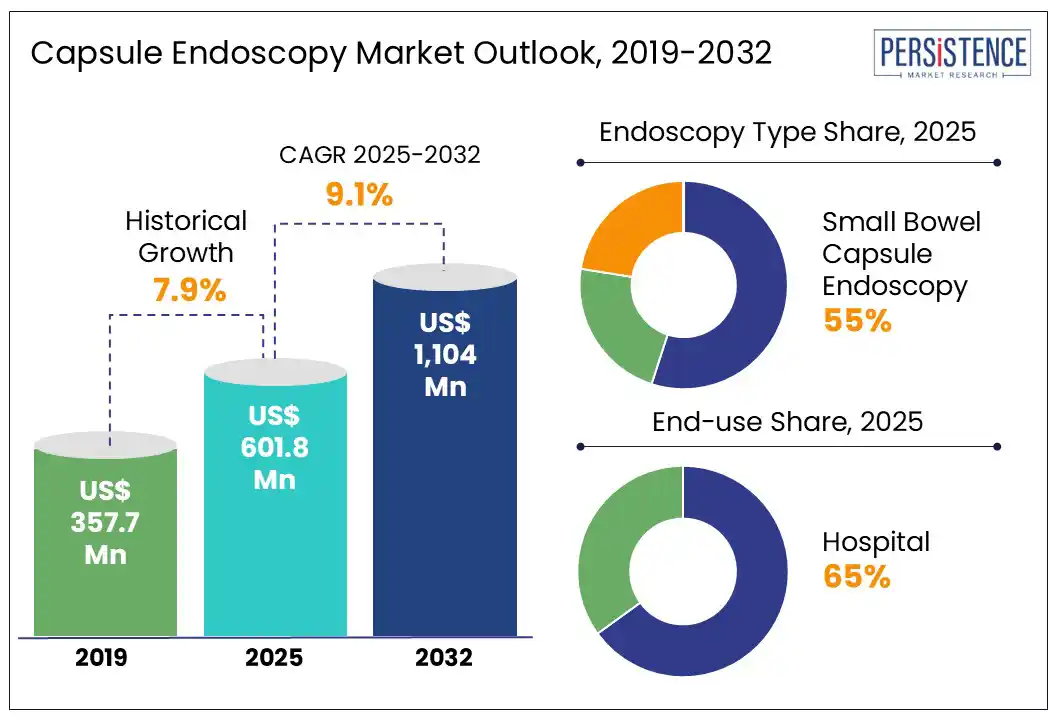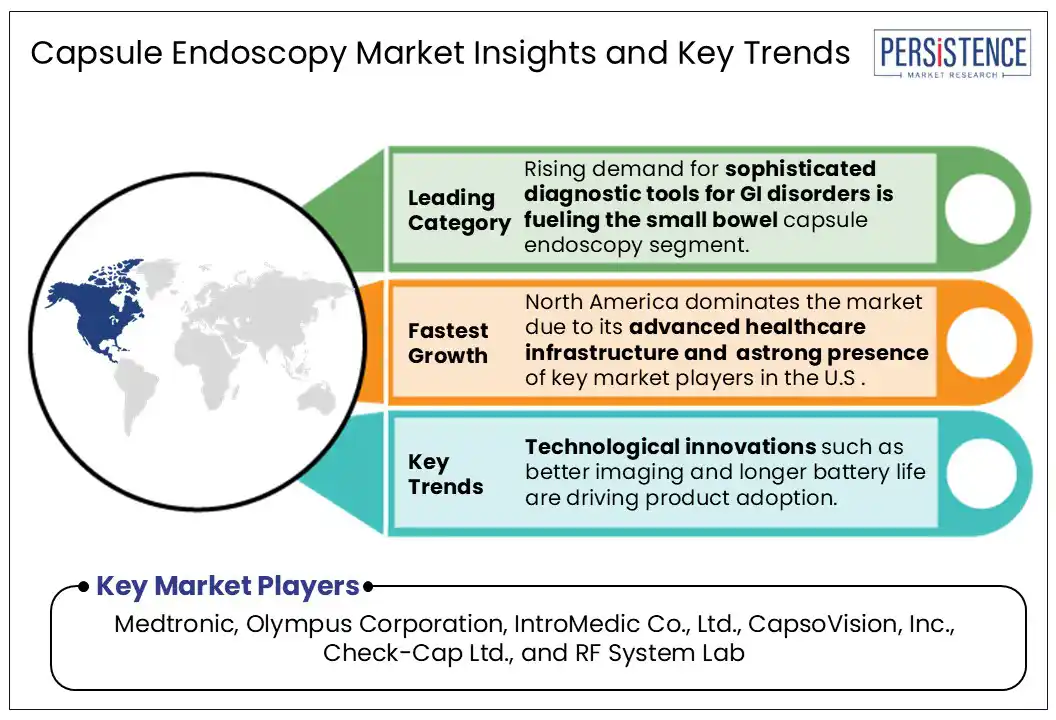ID: PMRREP35168| 250 Pages | 15 Jul 2025 | Format: PDF, Excel, PPT* | Healthcare

The global capsule endoscopy market size is likely to be valued at US$ 601.8 Mn in 2025 and is estimated to reach US$ 1,104 Mn in 2032, at a CAGR of 9.1% during the forecast period 2025 - 2032.
Capsule endoscopy is a minimally invasive diagnostic method that involves swallowing a small, wireless camera capsule to visualize the entire gastrointestinal (GI) tract. These capsules enable doctors and healthcare professionals to access hard-to-reach areas, such as the small intestine, that traditional endoscopes cannot reach. This method offers superior image quality, patient comfort, and access to entire GI segments, enabling earlier detection of conditions such as obscure GI bleeding (OGIB), Crohn’s disease, polyps, and tumors.
The capsule endoscopy market growth is driven by an increasing prevalence of gastrointestinal disorders, a strong shift toward minimally invasive diagnostic technologies, and a high demand for real-time monitoring.
The capsule endoscopy market is experiencing notable growth globally. Rising awareness about GI conditions and their complications is accelerating the demand for capsule-based imaging. Technological advancements, such as enhanced imaging resolution and extended battery life, are improving diagnostic accuracy and expanding clinical adoption. Additionally, a rise in healthcare spending, particularly in emerging economies, is supporting broader access to advanced endoscopic tools.

Key Industry Highlights
|
Global Market Attribute |
Key Insights |
|
Capsule Endoscopy Market Size (2025E) |
US$ 601.8 Mn |
|
Market Value Forecast (2032F) |
US$ 1,104 Mn |
|
Projected Growth (CAGR 2025 to 2032) |
9.1% |
|
Historical Market Growth (CAGR 2019 to 2024) |
7.9% |
Every year, millions of people around the world suffer from gastrointestinal disorders such as Crohn’s disease, celiac disease, colorectal cancer, and Obscure Gastrointestinal Bleeding (OGIB). For example, according to the World Cancer Research Fund, colorectal cancer is the third most common cancer in the world, with over 1.9 million new cases reported globally in 2022. As these conditions become more widespread due to aging populations, poor dietary habits, and sedentary lifestyles, the demand for non-invasive diagnostic procedures is expected to rise significantly. Capsule endoscopy offers a minimally invasive, patient-friendly solution that enables detailed visualization of the GI tract, making it increasingly preferred to traditional endoscopy. The shift toward new endoscopic technologies is accelerating the capsule endoscopy market growth.
While capsule endoscopy offers a revolutionary, non-invasive alternative to traditional procedures, its high cost remains a significant barrier to widespread adoption. The price of a single capsule can range from US$ 500 to US$ 1,000. Further, the overall expense becomes a challenge when factoring in additional costs for interpretation, software, and follow-up consultations, especially in developing economies.
Insurance coverage for capsule endoscopy varies widely across regions. In many cases, insurers only cover the procedure if conventional methods such as colonoscopy or endoscopy fail. As the market grows, greater insurance inclusion and cost-effective advancements will be key to ensuring broader accessibility and adoption of capsule endoscopy worldwide.
The future of capsule endoscopy is being shaped by developments in wireless and robotic-assisted capsule technology. Researchers are working on smart capsules with real-time control capabilities, allowing physicians to navigate the device remotely rather than relying solely on passive movement.
Future capsule models include microscopic robotic arms for targeted biopsies or drug delivery, enhancing diagnostic and therapeutic capabilities. The innovation is anticipated to revolutionize gastrointestinal disease management, offering less invasive, more precise treatment options. As R&D investment continues to grow, wireless and robotic-assisted capsule endoscopy is set to redefine the landscape of digestive healthcare, improving patient outcomes and increasing adoption rates worldwide.
By product type, the market has been segmented into small bowel capsule endoscopy, esophageal capsule endoscopy, and colon capsule endoscopy. The small bowel capsule endoscopy segment is anticipated to lead the market, accounting for approximately 55% share during the forecast period, owing to the rising need for sophisticated diagnostic tools for various disorders. With a focus on delivering efficient, patient-centric solutions, this segment is predicted to continue growing, leading to the launch of new products.
The increasing disposable income, swift technological progress in capsule endoscopy, increased demand for minimally invasive operations, and the establishment of essential screening programs for early cancer diagnosis are the key drivers fueling market expansion.
By end-use, the capsule endoscopy market has been divided into hospitals and outpatient facilities. The hospitals category led the market by end-use segmentation, with a revenue share of 65%, and is projected to experience the highest growth rate during the forecast period. The widespread adoption of advanced capsule endoscopy technologies by hospitals has been the key factor driving the dominance of the segment. In September 2024, AIIMS Nagpur (India) launched a new endoscopic suite under its Department of Medical Gastroenterology.

North America leads the capsule endoscopy market, accounting for approximately 44% of the total market share. This dominance is attributable to the region’s advanced healthcare infrastructure, high adoption of capsule endoscopy devices, and a strong focus on early diagnosis of gastrointestinal disorders. Strong presence of key market players in the U.S. and favorable reimbursement policy frameworks further support the widespread adoption of non-invasive diagnostic procedures. These factors have turned North America into a mature and innovation-driven market for capsule-based endoscopic technology.
Europe holds a significant position in the capsule endoscopy market. The region boasts a well-established medical ecosystem and is witnessing a growing awareness of GI health. Moreover, Europe also benefits from increasing investments in medical imaging technologies and a rising incidence of obscure gastrointestinal bleeding and other chronic digestive conditions. Additionally, healthcare systems across the European Union (EU) are progressively integrating capsule endoscopy into routine diagnostics, supported by clinical research and regulatory backing, which is expected to promote the adoption of minimally invasive diagnostic tools across hospitals and specialty clinics.
The Asia Pacific capsule endoscopy market is poised for the fastest growth during the forecast period, fueled by expanding access to modern healthcare facilities and technologies, rising disposable incomes, and a growing burden of gastrointestinal diseases. Countries such as China and India are witnessing increased demand for non-invasive diagnostic procedures, owing to supportive government initiatives and growing private sector investments in healthcare infrastructure. The region’s large patient population and growing awareness of capsule endoscopy technology are accelerating market penetration.
The global capsule endoscopy market is witnessing intense competition as key players strive to enhance diagnostic accuracy, miniaturization, and AI-powered image analysis. Leading manufacturers in the industry are investing in wireless imaging technology and real-time data transmission to improve gastrointestinal (GI) disease detection. Startups and emerging players focus on cost-effective capsule endoscopy solutions to make advanced diagnostics more accessible.
With the rising prevalence of colorectal cancer, Crohn’s disease, and small bowel disorders, the demand for non-invasive, patient-friendly diagnostics is surging. AI-driven image analysis, improved battery life, and enhanced biocompatibility are shaping the market dynamics.
The capsule endoscopy market is projected to reach US$ 601.8 Mn in 2025.
Rising cases of GI disorders and colorectal cancer are boosting demand for early diagnosis.
The capsule endoscopy market is poised to witness a CAGR of 9.1% from 2025 to 2032.
The next phase of innovation lies in smart capsules with robotic features, offering real-time navigation, biopsies, and targeted drug delivery.
Major players in the global capsule endoscopy market include BioCam, Olympus, Medtronic, CapsoVision, and RF Co., Ltd.
|
Report Attribute |
Details |
|
Historical Data/Actuals |
2019 - 2024 |
|
Forecast Period |
2025 - 2032 |
|
Market Analysis Units |
Value: US$ Mn |
|
Geographical Coverage |
|
|
Segmental Coverage |
|
|
Competitive Analysis |
|
|
Report Highlights |
|
|
Customization and Pricing |
Available upon request |
By Endoscopy Type
By Application
By End-use
By Region
Delivery Timelines
For more information on this report and its delivery timelines please get in touch with our sales team.
About Author